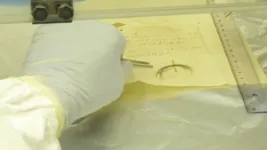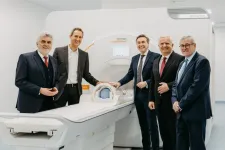(Press-News.org) In 1802, Ludwig van Beethoven asked his brothers to request that his doctor, J.A. Schmidt, describe his malady—his progressive hearing loss—to the world upon his death so that "as far as possible at least the world will be reconciled to me after my death." Now, more than two centuries later, a team of researchers reporting in the journal Current Biology on March 22 have partially fulfilled his wish by analyzing DNA they lifted and pieced together from locks of his hair.
“Our primary goal was to shed light on Beethoven’s health problems, which famously include progressive hearing loss, beginning in his mid- to late-20s and eventually leading to him being functionally deaf by 1818,” said Johannes Krause from the Max Planck Institute for Evolutionary Anthropology in Leipzig, Germany.
“We were unable to find a definitive cause for Beethoven’s deafness or gastrointestinal problems,” Krause says. “However, we did discover a number of significant genetic risk factors for liver disease. We also found evidence of an infection with hepatitis B virus in at latest the months before the composer’s final illness. Those likely contributed to his death.”
As commonly happens when people analyze DNA, the researchers uncovered another surprise. Beethoven’s Y chromosome doesn’t match that of any of five modern-day relatives carrying the same last name and sharing, on the basis of genealogical records, a common ancestor with Beethoven’s paternal line. The finding points to an extramarital “event” somewhere over the generations on Beethoven’s father’s side.
“This finding suggests an extrapair paternity event in his paternal line between the conception of Hendrik van Beethoven in Kampenhout, Belgium in c.1572 and the conception of Ludwig van Beethoven seven generations later in 1770, in Bonn, Germany,” says Tristan Begg, now at the University of Cambridge, U.K.
The idea for the work was conceived by Begg and study co-author William Meredith almost a decade ago. They were motivated by Beethoven’s request for postmortem studies to describe his illness and make it public. In the new study, the team, also including Toomas Kivisild of Katholieke Universiteit Leuven in Belgium, relied on recent improvements in ancient DNA analysis; these improvements have enabled whole-genome sequencing from small quantities of historical hair.
First, they analyzed independently sourced locks of hair attributed to Beethoven, only five of which they confirmed came from the same European male. They deemed these five to be “almost certainly authentic” and used them to sequence Beethoven’s genome to 24-fold genomic coverage.
Medical biographers had earlier suggested that Beethoven had many substantially heritable health conditions. But the researchers in this study couldn’t find in his genome an explanation for Beethoven’s hearing disorder or gastrointestinal problems. They did find that he was genetically predisposed to liver disease.
Further study of other DNA in his samples suggested that he also had a hepatitis B infection at least during the months leading up to his death. “Together with the genetic predisposition and his broadly accepted alcohol consumption, these present plausible explanations for Beethoven’s severe liver disease, which culminated in his death,” they write.
The researchers note that previous analyses suggesting that Beethoven had lead poisoning turned out to have been based on a sample that wasn’t Beethoven’s at all; instead, it came from a female. Future studies testing for lead, opiates, and mercury must be based on authenticated samples, they say.
The DNA extracted from Beethoven’s hair is genetically most similar to that of people living in present day North Rhine-Westphalia, consistent with Beethoven’s known German ancestry, Begg says. Future studies of Beethoven’s samples collected over time might help to clarify when he got infected with hepatitis B. Meanwhile, more studies of his close relatives might help to clarify his biological relationship to modern decedents of the Beethoven family.
####
This work was supported by the American Beethoven Society and the Hugh Stuart Center Charitable Trust.
Current Biology, Begg et al.: “Genomic analyses of hair from Ludwig van Beethoven” https://www.cell.com/current-biology/fulltext/S0960-9822(23)00181-1
Current Biology (@CurrentBiology), published by Cell Press, is a bimonthly journal that features papers across all areas of biology. Current Biology strives to foster communication across fields of biology, both by publishing important findings of general interest and through highly accessible front matter for non-specialists. Visit http://www.cell.com/current-biology. To receive Cell Press media alerts, contact press@cell.com.
END
Scientists in California are raising the alarm about a newly reported form of toxoplasmosis that kills sea otters and could also infect other animals and people. Although toxoplasmosis is common in sea otters and can sometimes be fatal, this unusual strain appears to be capable of rapidly killing healthy adult otters. This rare strain of Toxoplasma hasn’t been detected on the California coast before, and may be a recent arrival, but scientists are concerned that if it contaminates the marine food chain it could potentially pose a public health risk.
“I have studied Toxoplasma infections in sea otters for 25 years — I have never ...
Four sea otters that stranded in California died from an unusually severe form of toxoplasmosis, according to a study from the California Department of Fish and Wildlife and the University of California, Davis. The disease is caused by the microscopic parasite Toxoplasma gondii. Scientists warn that this rare strain, never previously reported in aquatic animals, could pose a health threat to other marine wildlife and humans.
The preliminary findings, published in the journal Frontiers in Marine Science, note that toxoplasmosis is common in sea otters and can be fatal. This unusual strain appears to be especially virulent and capable of rapidly killing healthy adult otters.
The ...
About The Study: Statin use for primary prevention of atherosclerotic cardiovascular disease (ASCVD) was low among all race and ethnicity groups regardless of ASCVD risk, with the lowest use occurring among Black and Hispanic adults in this study of survey data representing 39.4 million adults. Improvements in access to care may promote equitable use of primary prevention statins in Black and Hispanic adults.
Authors: Joshua A. Jacobs, Pharm.D., of the Spencer Fox Eccles University of Utah School of Medicine in Salt Lake City, and Ambarish Pandey, M.D., of the University of Texas Southwestern Medical Center in Dallas, are the corresponding authors.
To ...
About The Study: In this analysis involving 19,000 female participants, mailing human papillomavirus (HPV) self-sampling kits to women overdue for cervical cancer screening was cost-effective for increased screening uptake relative to usual care. These results support mailing HPV kits as an efficient outreach strategy for increasing screening rates among eligible women in U.S. health care systems.
Authors: Richard T. Meenan, Ph.D., M.P.H., M.B.A., of Kaiser Permanente Northwest in Portland, Oregon, is the corresponding author.
To access the embargoed study: Visit our For The Media website at this link ...
Chocolate bars, crisps and fries - why can't we just ignore them in the supermarket? Researchers at the Max Planck Institute for Metabolism Research in Cologne, in collaboration with Yale University, have now shown that foods with a high fat and sugar content change our brain: If we regularly eat even small amounts of them, the brain learns to consume precisely these foods in the future.
Why do we like unhealthy and fattening foods so much? How does this preference develop in the brain? "Our tendency to eat high-fat and high-sugar foods, the so-called Western diet, could be innate or develop as a result of being overweight. But we think that the brain learns this preference," ...
A new study from researchers from Brigham and Women’s Hospital, a founding member of the Mass General Brigham healthcare system, has shed new light on the best strategies hospitals can use for medication reconciliation, the critical and difficult task of updating and verifying a patient’s medication lists and orders, regardless of where they are in the health care system. The study, published in BMJ Quality and Safety, is a new analysis of data from the second Multi-center Medication Reconciliation ...
Lithium-ion batteries are ubiquitous today - from electric cars to smartphones. But that does not mean that they are the best solution for all areas of application. TU Wien has now succeeded in developing an oxygen-ion battery that has some important advantages. Although it does not allow for quite as high energy densities as the lithium-ion battery, its storage capacity does not decrease irrevocably over time: it can be regenerated and thus may enable an extremely long service life.
In addition, oxygen-ion batteries can be ...
On Wednesday, 22 March 2023, at Otto von Guericke University Magdeburg, Europe’s most powerful 7-Tesla magnetic resonance imaging (MRI) machine was formally inaugurated. The symbolic push of the button to start the high-performance MRI machine for future research work took place in the presence of the Minister of Science for Saxony-Anhalt, Prof. Dr. Armin Willingmann.
Henceforth, the MAGNETOM Terra.X Impulse Edition will enable brain functions and structures to be mapped and measured on site with a previously unachievable level of precision. “With ...
As the search for high-quality pharmaceutical drugs continues, researchers also continue spending countless hours discovering the underlying mechanisms of drug action. Knowing various pathophysiological mechanisms dramatically expedites the process of drug discovery. A recent example includes the discovery of the broad-spectrum anti-inflammatory effects of inosine, a nucleoside found in transfer RNAs, by researchers in China. These findings were made available online on 22 October 2022 and subsequently published in Volume 13, Issue 1 of Journal of Pharmaceutical Analysis (JPA) on 1st January 2023.
The ...
SAN DIEGO, March 22, 2023 — PetDx® – The Liquid Biopsy Company for Pets™ published a study today showing that OncoK9®, its multi-cancer early detection test for dogs using next-generation sequencing (NGS) technology, performs similarly in real-world veterinary practice settings as in the CANcer Detection in Dogs (CANDiD) study, the test’s landmark clinical validation study. Appearing in the Journal of the American Veterinary Medical Association, the new study examined the clinical experience with 1,500 consecutive blood samples submitted ...





